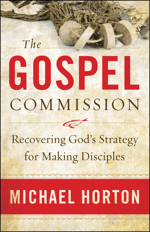Review: The Gospel Commission


I’ve been thinking a lot about the purpose of the church. In particular, I’ve been thinking about what Michael Horton calls mission creep: the expansion of a mission beyond its original goals. Does the church have a specific mission? If so, what is it, and how free are we to add good things to what a church is doing?
Horton’s book Gospel Commission, The: Recovering God’s Strategy for Making Disciples

arrived the day before a meeting of our elders to consider the purpose of the big-c Church. It couldn’t have come at a better time. This is not an abstract issue. It’s the very issue that we’re facing.
Horton argues that we need to return to our central mission, the Great Commission. “I believe that in our passion for relevance,” he writes, “we are subordinating the strategies that Christ has promised to bless to our own action plans.” Horton believes that the Great Commission provides the church with its message (the announcement of Christ’s authority), its mission (to proclaim the gospel and make disciples), and its methods (baptism and Word ministry). We’re not free to pick our mission and then choose our own methods, Horton argues. Christ has prescribed how we’re to go about carrying out his mission.
Here’s where it gets controversial. “Christians are called to do many things that the church is not called to do.” In other words, the church is called to focus on its mission of making disciples, but it is not called to do everything that individual Christians are called to do. For instance:
What I am suggesting is that there are myriad causes that are good, bad, and indifferent for which the church has no special competence or commission. Why do we think that if something is worthwhile for a Christian (or group of Christians) to invest in, it has to be done by the church as an official activity?
We cannot, he argues, confuse the Great Commission (to make disciples) with the Great Commandment (to love God and others). I love the way he makes the distinction:

“The Great Commission reflects the holy (saving grace) and is where disciples are made,” he writes. “The Great Commandment reflects common grace and is where our discipleship grows.”
At a practical level, Horton argues that the church as become lazy and distracted. We’ve buried “the church’s ministry in a heap of programs and strategies of our own making.” Scripture provides us with explicit strategies in the Great Commission, and we see the practical outworking of these strategies in Acts and the Epistles.
This was a timely book for me. I found it to be clear and compelling. Horton helped me gain clarity on the church’s calling and answered many of my objections.
(I’m also looking forward to reading What Is the Mission of the Church? by Greg Gilbert and Kevin DeYoung, which wrestles with similar issues.)

Book has been provided courtesy of Baker Publishing Group and Graf-Martin Communications, Inc. Available at your favorite bookseller from Baker Books, a division of Baker Publishing Group.






